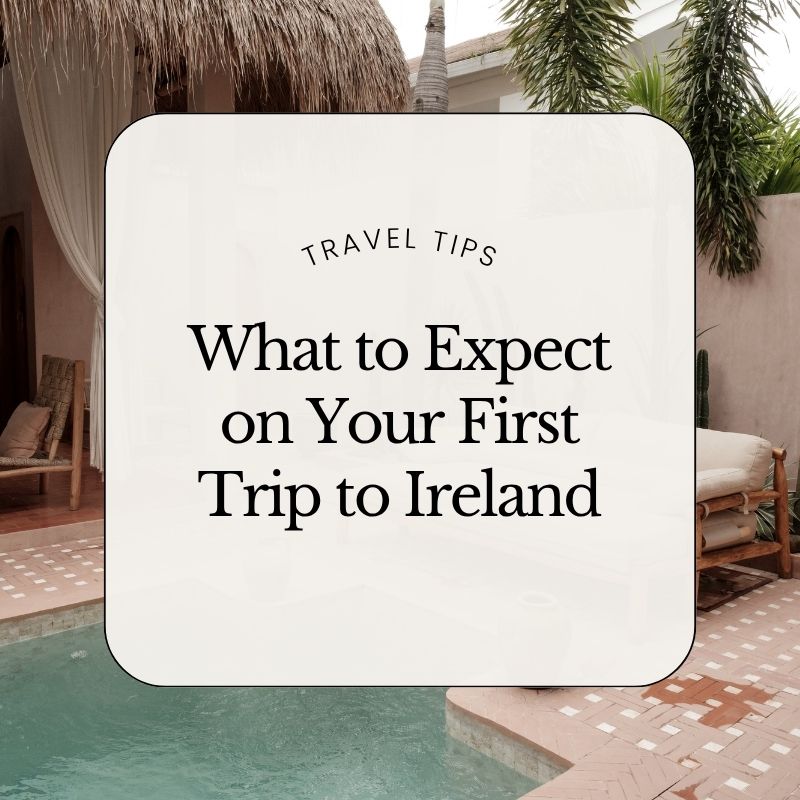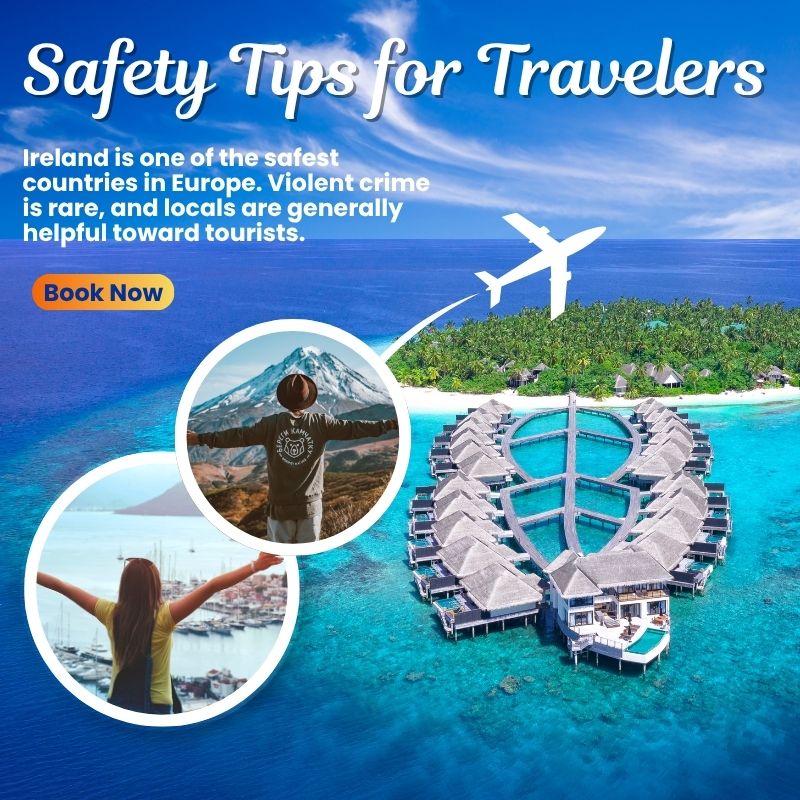Planning your first trip to Ireland? You’re in for a treat! With its lush green landscapes, lively pubs, and warm hospitality, Ireland offers travelers an experience that feels both ancient and refreshingly alive. From navigating narrow country roads to ordering your first pint in a local pub, these must-know travel tips will help you make the most of your Irish adventure. If you love exploring different cultures, you might also enjoy our guide on Essential China Travel Tips for First-Time Visitors to see how travel experiences vary across countries.
What to Expect on Your First Trip to Ireland

Ireland greets visitors with charm, humor, and friendliness. Locals are known for their easy-going nature and love of conversation—don’t be surprised if a simple “hello” turns into a full chat about the weather, sports, or local folklore. Expect slower travel days, stunning scenery, and a strong sense of community, especially in small towns and villages.For insight into respecting cultural norms abroad, check out What to Avoid While Traveling in China
Language: Understanding the Irish Way of Speaking
While English is the main language, you’ll see Irish (Gaelic) on road signs and public notices. Don’t worry—everyone speaks English fluently. However, Irish accents can vary widely across regions. Phrases like “What’s the craic?” mean “What’s happening?” or “How are you?” Embracing local slang will make your interactions more enjoyable.
Transportation: Getting Around Ireland
Ireland’s public transportation is reliable in major cities like Dublin, Cork, and Galway. Buses and trains connect most towns, but rural areas may have limited service. If you plan to explore the countryside, renting a car offers the most freedom. Alternatively, guided tours are ideal for those who prefer a stress-free experience. For more tips on exploring destinations efficiently, visit our Travel to China Guide.
Renting a Car in Ireland
To rent a car, you’ll need a valid driver’s license and a credit card. Most rental companies require drivers to be at least 25 years old, though some accept younger drivers with an added fee. Book your vehicle early, especially in peak seasons, and always double-check insurance options. Collision Damage Waiver (CDW) is mandatory in Ireland and usually included in the rental cost. For detailed advice on road trips, see our Ireland Travel Tips for Driving Across the Country
Driving in Ireland / Roads in Ireland
Driving on the left side of the road can feel tricky at first, but you’ll adjust quickly. Many rural roads are narrow and winding, so stay alert and take your time. Roundabouts are common—always yield to traffic coming from the right. Use GPS or Google Maps, but remember that mobile signal can be patchy in remote areas. Parking in towns is usually paid; keep coins handy for meters.
Currency, Credit Cards, and ATMs
Ireland uses the Euro (€), while Northern Ireland uses the British Pound (£). Most shops, hotels, and restaurants accept major credit cards, but it’s smart to carry some cash, especially in smaller villages or local markets. ATMs are widely available, but check your bank’s foreign transaction fees before withdrawing money.
Safety Tips for Travelers

Ireland is one of the safest countries in Europe. Violent crime is rare, and locals are generally helpful toward tourists. Still, exercise basic precautions—keep your belongings secure, avoid isolated areas at night, and beware of pickpockets in crowded spots like Temple Bar in Dublin. For emergencies, dial 112 or 999. Travel insurance that includes health coverage is always a wise choice. If you’re booking your trip through an agent, you may find Should You Tip Your Travel Agent for Booking a Vacation? useful.
Weather: How to Pack for Ireland’s Climate
Ireland’s weather is famously unpredictable. You might experience sunshine, rain, and wind all in the same hour! Layers are your best friend. Pack waterproof jackets, sturdy shoes, and a small umbrella. Summers (June–August) are mild with long daylight hours, while winters are chilly but rarely freezing. The key is to dress comfortably for changing conditions.If you’re heading to other cooler destinations, check out What to Pack for a Summer Trip to Iceland for versatile packing advice.
Restaurants and Food Culture
Irish food is hearty, comforting, and far more diverse than you might expect. Try classics like Irish stew, fish and chips, and soda bread. Don’t skip breakfast—it’s famously generous, with eggs, bacon, sausages, and black pudding. Most restaurants don’t include tips in the bill; leaving 10–12% is appreciated for good service. Vegetarian and vegan options are widely available in urban areas. To learn about global service customs, read Travel Agent Tipping Etiquette.
Accommodations in Ireland
Ireland’s accommodations range from cozy B&Bs and countryside guesthouses to luxury castle hotels. Bed and breakfasts are a cultural experience in themselves—hosts often serve homemade breakfasts and share local travel tips. During high season (May–September), book in advance to secure the best rates and locations. Many rural stays offer stunning views of rolling hills or seaside cliffs. Want to know more about service appreciation? Here’s When and How Much to Tip a Travel Agent for general guidance on tipping practices.
Electricity & Plug Type
Ireland uses the Type G plug (same as the UK), with a 230V supply. Bring a universal adapter if you’re traveling from outside Europe. Most hotels provide hair dryers and kettles, but charging multiple devices might require a power strip with surge protection.
Public Restrooms & Cleanliness
Public restrooms are available in shopping centers, cafes, and some petrol stations. In small towns, it’s common to ask politely to use a restroom in a café or pub. Keep coins handy—some public facilities charge a small fee. Ireland is generally very clean, and locals appreciate travelers who respect that.
Other Must-Know Travel Tips
- Wi-Fi & SIM Cards: Free Wi-Fi is common in cities. For better connectivity, buy a local SIM card from Vodafone or Three.
- Festivals: Don’t miss local celebrations like St. Patrick’s Day, Galway Arts Festival, or small-town music events.
- Time Zone: Ireland follows Greenwich Mean Time (GMT) and switches to daylight saving in summer.
- Politeness Counts: A friendly “thank you” or “cheers” goes a long way in Ireland!
Budget & Money-Saving Advice
Ireland can be pricey, but there are many ways to travel smart.
- Use discount passes such as the Dublin Pass or Heritage Card for attractions.
- Opt for local eateries over tourist restaurants.
- Many museums and parks are free to enter.
- Traveling off-season (spring or fall) offers lower prices and fewer crowds.
Budget travelers can expect to spend around €80–€120 per day, including meals and accommodation.If you’re seeking budget inspiration, explore Budget-Friendly Travel Tips for Exploring Iceland 2025.
Sustainability & Responsible Tourism
Traveling responsibly helps preserve Ireland’s natural beauty. Respect wildlife, avoid littering, and stay on marked paths when hiking. Support local artisans, family-run shops, and eco-friendly accommodations. Many towns encourage recycling and plastic-free practices, so bring a reusable water bottle and tote bag. You can also learn how other destinations promote eco-tourism by reading Iceland Travel Tips for Visiting in Winter.
Where to Visit on Your First Trip to Ireland
Start in Dublin, where history meets lively nightlife. Then head west to Galway for its colorful streets and artsy vibe. Don’t miss the Cliffs of Moher, Ring of Kerry, or the mystical Giant’s Causeway in Northern Ireland. For a quieter escape, visit Dingle Peninsula or Connemara, where rugged beauty meets peaceful solitude.
Resources to Help Plan Your Ireland Trip
- Discover Ireland – Official tourism website
- Transport for Ireland – Travel planning & schedules
- Heritage Ireland – Information on historic sites
Final Thoughts
Your first trip to Ireland will likely leave you longing to return. The country’s magic lies not only in its landscapes but also in its people—their humor, warmth, and storytelling traditions. With these must-know travel tips, you’re ready to explore Ireland with confidence, respect, and curiosity.
So pack your raincoat, keep an open mind, and get ready for an unforgettable journey through the Emerald Isle.

